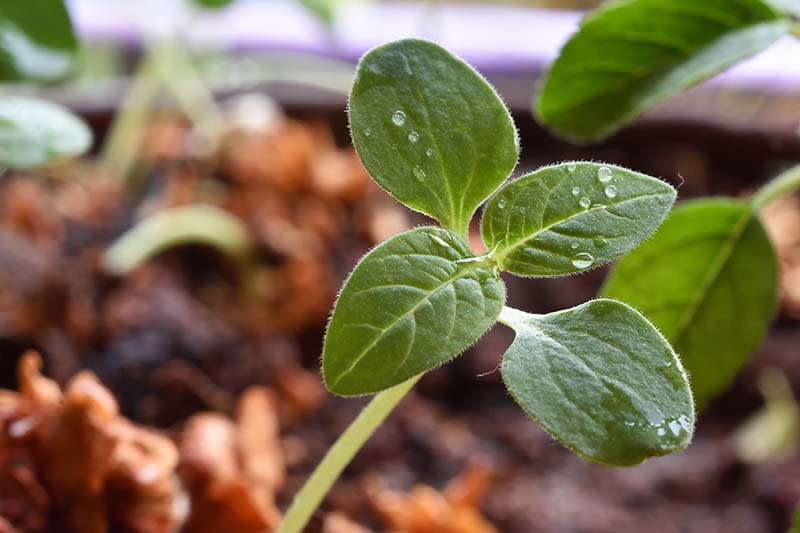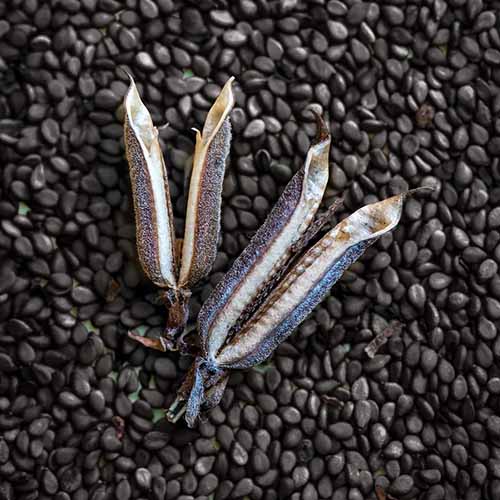17+ Sesame Plant Seedling
Sesame seed harvest occurs 90-150 days from planting. The tiny nutrition-packed seeds carry a robust nutty flavor enhanced by lightly toasting them.

Grow Your Own Sesame Seeds Hobby Farms
Plant fairly densely at 15cm 6 spacing in rows 60-45cm 24-36 wide.

. Variety to be tested. Learn the best conditions for growing sesame plants including light temperature water soil. Web May 8 2022 by Kat Sanchez Sesamum indicum Sesame is one of the most ancient cultivated crops and it may be the first seed that was grown for oil.
Dont over-water however as this could. Seedlings are especially prey to fungal diseases. Web Do not fertilize sesame plants and avoid drip irrigation as they really do like it dry.
The plants are traditionally grown in Sub-Saharan Africa and India. Web The sesame plant Sesamum indicum is grown for its seeds. Plus get tips for harvesting the seeds.
Web Sesame seeds approximately 50 oil and 25 protein are used in baking candy making and other food industries. SW-17 1125 Tan Medium Medium 1 Short60 in. Sesame plants prefer warm air and soil so wait until the daytime temps are regularly in the 70s before moving your seedlings outdoors.
Web Sesame is an erect annual plant that can reach 4 -7 feet in height when planted early under high moisture conditions. Food and Drug Administration guidelines as of January 1 2023. Place the seeds in the furrows an inch apart.
Widely cultivated the sesame plant is found in most of the tropical subtropical and southern temperate areas of the world. Flowers will eventually develop into dozens of elongated seed pods. Web Sesame is a fun plant to grow for its tasty seeds.
Web In most climates start sesame seeds indoors 4-6 weeks before your last spring frost date. Its an oilseed crop and is thought to be one of the oldest crops cultivated in human history. Sesame seed or Benne is a tall-growing annual seeding crop that will achieve 3 to 5 feet in height at maturity.
Damping off will kill young plants. Sesame is usually ready for harvesting between 90 to 130 days after planting. The entirety of the sesame plant was used extensively in West African cuisine.
Web Plant sesame in full sunlight spaced 2-3 feet apart to allow healthy development. Sesame seeds also provide calcium B vitamins vitamin E and antioxidants. The leaves also start to drop from the plants.
Water While regular watering is important for germination and establishing young plants sesame plants dont need much water. Sprinkle fine moist soil over the seeds and pat it down gently. No fertilization is required and in fact should be discouraged.
Transplant sesame plants outdoors after temperatures have reached. Web A sandy loamy soil is a good option. Web Start benne seeds indoors about a month before the last expected frost.
Keep the potting mix moist and watch for seeds to germinate in a couple of weeks. Sesame plants are often attacked and damaged by aphids. Web In the North start seeds indoors under lights four to six weeks before transplanting the seedlings out into the garden after the danger of frost has passed.
Web In conclusion this is the first report of sesame mutants which are highly drought-tolerant and stable during seed germination and early seedling growth managing to germinate and grow under severe drought corresponding to a water osmotic potential of 12 MPa. Plant the seeds in small pots covered with about ¼ inch 6 mm of a good quality lightweight potting mix. Commercial sesame production is largely for producing oil from the seeds.
The harvesting takes place when the fruit at the base are ripe the seeds from the fruit get the color specific to the variety and the leaves at the base of the stem have fallen. In West Texas it is generally 3 6 feet. Web Sesame seeds also called benne are believed to have been brought into the 17th-century colonial America by enslaved West Africans.
Sesame cannot handle standing water or wet soils or heavy clay soils nor will it tolerate salty soil or salt air. Seeds are ready to be harvested when these pods turn brown and begin to open. Sesame is indeterminate so it will continue to bloom and set seed capsules until the end of summer.
Web Sesame plants thrive in dry warm environments. It is used in a variety of products including soaps and pharmaceuticals. For the home gardener this can be a fun plant to grow for the seeds and cooking.
Web Mark the rows 20 to 30 inches apart making furrows about a ½-inch deep. When mature the leaves and stems of sesame plants change from green to yellow to red. Thrips will stunt seedlings and injure developing flower buds so that capsules do.
Root rots are also a potential problem although most sesame varieties have. Web How to harvest sesame. The total seeding depth would be from 34 inch to 15 inches.
Once established sesame can thrive even in high temperatures with little water. Some varieties have 6 flowers per stem per day for 25 40 days. Boggy soil excess rainfall cool temperatures and high humidity encourage the formation of fungal spores and their dissemination.
Water the plot every two to three days or as needed to maintain evenly moist soil until the sesame seedlings emerge. Expect flowering to peak in mid- to late summer. Crops must be harvested prior to the first killing frost.
Web What are Sesame Seed Plants. This means that packaged food must list. Sesame is commonly used for quail or dove fields exotic bird feed duck plots food plots and game bird attractants.
Web All very interesting but how do growers know when to pick sesame seeds. Flowers appear about 38 45 days after planting with 2 flowers per stem per day for about 35 40. Web sesame Sesamum indicum also called benne erect annual plant of the family Pedaliaceae grown since antiquity for its seeds which are used as food and flavouring and from which a prized oil is extracted.
Planting Sesame Place the seed 12 inch to 34 inch below the defined moisture line with a 14 inch to 34 dry covering of dry soil above that line. Web Clare Mulroy USA TODAY Sesame seeds joined the major food allergens list under US. Web The sesame plant Sesamum indicum produces seeds that contain protein fiber and healthy fats.
Sesame prefers warm soil. Sesame seed plants Sesamum indicum are annuals which you usually find growing in tropical areas. Harden off seedlings and then plant sesame seedlings outdoors 2-3 weeks after your last frost date.

How To Grow Sesame Seeds Growing In The Garden

Sesame Plant Drought Tolerant Seed Crop Epic Gardening

How To Grow Sesame Seeds Growing In The Garden
:strip_icc()/GettyImages-1252413065-c9c1f1c1b81448788a41051544da9b98.jpg)
How To Plant Grow And Care For Sesame

Photo Of The Seedling Or Young Plant Of Black Sesame Sesamum Indicum Nigrum Posted By Greene Garden Org

How To Grow Sesame Seeds Growing In The Garden

How To Grow Sesame Seeds Growing In The Garden

How To Plant And Grow Sesame Gardener S Path

How To Grow Sesame Seeds Growing In The Garden

Dutch Passion Auto Power Plant Grow Diary Journal Week7 By Thecannaprophet Growdiaries

Growing Sesame From Seeds How To Plant Sesame Seeds In The Garden

Sesame Cultivation Expansion Versus Temperature Stress Sustainable Secure Food Blog

Up Sesame Seedlings Stock Photo 19170972 Pixta

How To Grow Sesame Seeds Growing In The Garden

Figure S2 Normal Hypocotyl Elongation Under Red Led Light Seedlings Download Scientific Diagram

How To Plant And Grow Sesame Gardener S Path

How To Grow Sesame Seeds Growing In The Garden